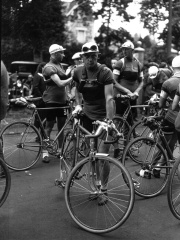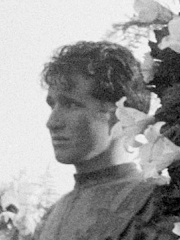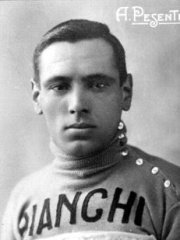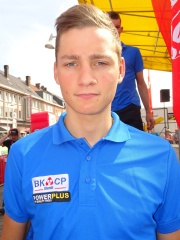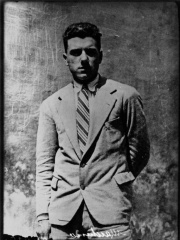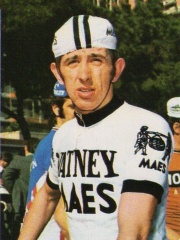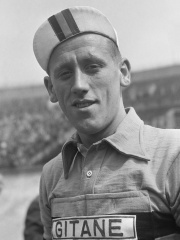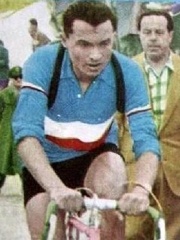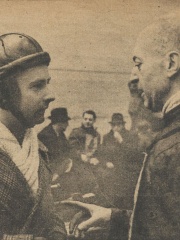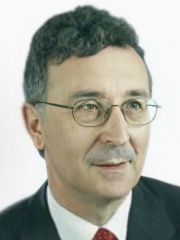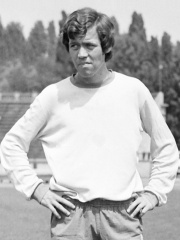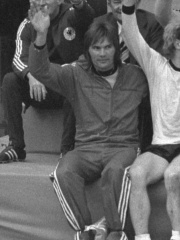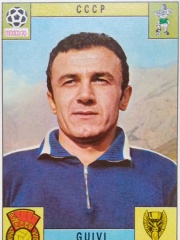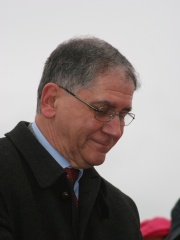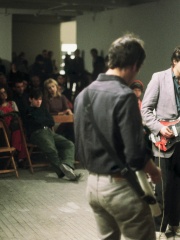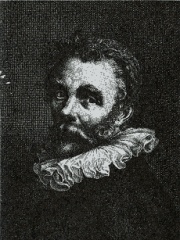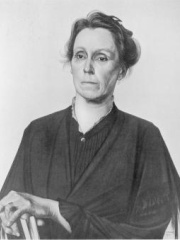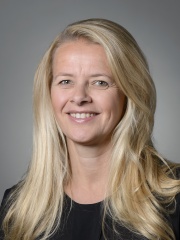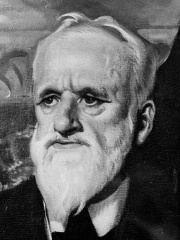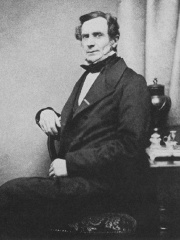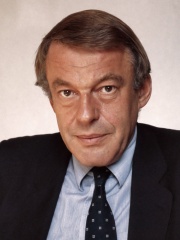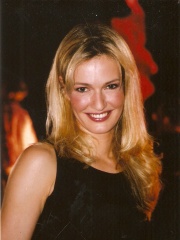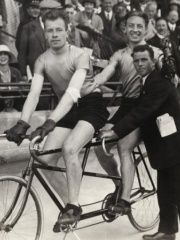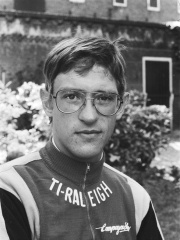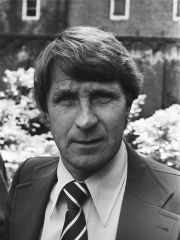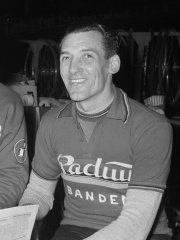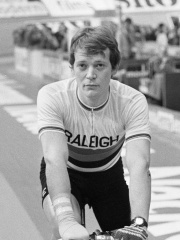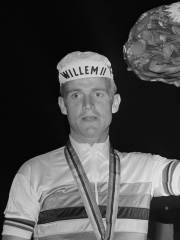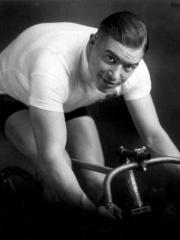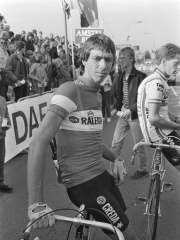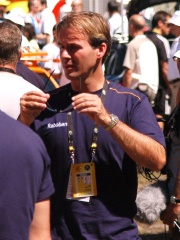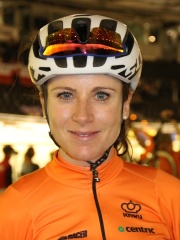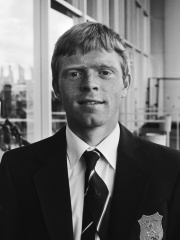Cyclist
Joseph Bruyère
1948 - today
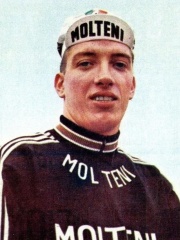
 Joseph Bruyère
Joseph Bruyère
Joseph Bruyere or Bruyère (born 5 October 1948 in Maastricht, Netherlands) is a former Belgian cyclist. Read more on Wikipedia
His biography is available in 16 different languages on Wikipedia (up from 15 in 2024). Joseph Bruyère is the 224th most popular cyclist (up from 265th in 2024), the 774th most popular biography from Netherlands (up from 895th in 2019) and the 15th most popular Dutch Cyclist.
Memorability Metrics
Page views of Joseph Bruyère by language
Among Cyclists
Among cyclists, Joseph Bruyère ranks 224 out of 1,613. Before him are Giuseppe Saronni, Max Bulla, Edward Battell, Arnaldo Pambianco, Antonio Pesenti, and Mathieu van der Poel. After him are Luigi Marchisio, Frans Verbeeck, Phil Anderson, Jean Brankart, Jean Dotto, and Louis Chaillot.
Most Popular Cyclists in Wikipedia
Go to all RankingsGiuseppe Saronni
1957 - Present
HPI: 55.56
Rank: 218
Max Bulla
1905 - 1990
HPI: 55.52
Rank: 219
Edward Battell
1900 - 2000
HPI: 55.52
Rank: 220
Arnaldo Pambianco
1935 - 2022
HPI: 55.50
Rank: 221
Antonio Pesenti
1908 - 1968
HPI: 55.50
Rank: 222
Mathieu van der Poel
1995 - Present
HPI: 55.45
Rank: 223
Joseph Bruyère
1948 - Present
HPI: 55.45
Rank: 224
Luigi Marchisio
1909 - 1992
HPI: 55.39
Rank: 225
Frans Verbeeck
1941 - Present
HPI: 55.39
Rank: 226
Phil Anderson
1958 - Present
HPI: 55.38
Rank: 227
Jean Brankart
1930 - 2020
HPI: 55.37
Rank: 228
Jean Dotto
1928 - 2000
HPI: 55.33
Rank: 229
Louis Chaillot
1914 - 1998
HPI: 55.32
Rank: 230
Contemporaries
Among people born in 1948, Joseph Bruyère ranks 494. Before him are Ylli Bufi, Richard Dembo, Florea Dumitrache, Mamoru Mohri, Norbert Nigbur, and Givi Nodia. After him are Kathleen Battle, Bernadette Peters, Rocco Buttiglione, Hrafn Gunnlaugsson, Abdulqawi Yusuf, and Glenn Branca.
Others Born in 1948
Go to all RankingsYlli Bufi
POLITICIAN
1948 - Present
HPI: 55.56
Rank: 488
Richard Dembo
FILM DIRECTOR
1948 - 2004
HPI: 55.54
Rank: 489
Florea Dumitrache
SOCCER PLAYER
1948 - 2007
HPI: 55.51
Rank: 490
Mamoru Mohri
ASTRONAUT
1948 - Present
HPI: 55.51
Rank: 491
Norbert Nigbur
SOCCER PLAYER
1948 - Present
HPI: 55.49
Rank: 492
Givi Nodia
SOCCER PLAYER
1948 - 2005
HPI: 55.47
Rank: 493
Joseph Bruyère
CYCLIST
1948 - Present
HPI: 55.45
Rank: 494
Kathleen Battle
SINGER
1948 - Present
HPI: 55.43
Rank: 495
Bernadette Peters
ACTOR
1948 - Present
HPI: 55.42
Rank: 496
Rocco Buttiglione
POLITICIAN
1948 - Present
HPI: 55.41
Rank: 497
Hrafn Gunnlaugsson
FILM DIRECTOR
1948 - Present
HPI: 55.39
Rank: 498
Abdulqawi Yusuf
LAWYER
1948 - Present
HPI: 55.35
Rank: 499
Glenn Branca
COMPOSER
1948 - 2018
HPI: 55.35
Rank: 500
In Netherlands
Among people born in Netherlands, Joseph Bruyère ranks 774 out of 1,646. Before him are Dirk Hartog (1580), Ed de Goey (1966), Cornelis Ketel (1548), Henriette Roland Holst (1869), Princess Mabel of Orange-Nassau (1968), and Pieter Cort van der Linden (1846). After him are Frederik Kaiser (1808), Zara Whites (1968), Badr Hari (1984), Hans van Mierlo (1931), Karen Mulder (1970), and Daley Blind (1990).
Others born in Netherlands
Go to all RankingsDirk Hartog
EXPLORER
1580 - 1621
HPI: 55.61
Rank: 768
Ed de Goey
SOCCER PLAYER
1966 - Present
HPI: 55.61
Rank: 769
Cornelis Ketel
PAINTER
1548 - 1616
HPI: 55.60
Rank: 770
Henriette Roland Holst
WRITER
1869 - 1952
HPI: 55.57
Rank: 771
Princess Mabel of Orange-Nassau
POLITICIAN
1968 - Present
HPI: 55.53
Rank: 772
Pieter Cort van der Linden
POLITICIAN
1846 - 1935
HPI: 55.48
Rank: 773
Joseph Bruyère
CYCLIST
1948 - Present
HPI: 55.45
Rank: 774
Frederik Kaiser
ASTRONOMER
1808 - 1872
HPI: 55.45
Rank: 775
Zara Whites
PORNOGRAPHIC ACTOR
1968 - Present
HPI: 55.40
Rank: 776
Badr Hari
POLITICIAN
1984 - Present
HPI: 55.40
Rank: 777
Hans van Mierlo
POLITICIAN
1931 - 2010
HPI: 55.37
Rank: 778
Karen Mulder
SINGER
1970 - Present
HPI: 55.35
Rank: 779
Daley Blind
SOCCER PLAYER
1990 - Present
HPI: 55.33
Rank: 780
Among Cyclists In Netherlands
Among cyclists born in Netherlands, Joseph Bruyère ranks 15. Before him are Bernard Leene (1903), Gerrie Knetemann (1951), Peter Post (1933), Gerrit Voorting (1923), René Pijnen (1946), and Harm Ottenbros (1943). After him are Jan Pijnenburg (1906), Steven Rooks (1960), Johan van der Velde (1956), Erik Breukink (1964), Annemiek van Vleuten (1982), and Peter Winnen (1957).
Bernard Leene
1903 - 1988
HPI: 57.42
Rank: 9
Gerrie Knetemann
1951 - 2004
HPI: 57.31
Rank: 10
Peter Post
1933 - 2011
HPI: 57.30
Rank: 11
Gerrit Voorting
1923 - 2015
HPI: 57.09
Rank: 12
René Pijnen
1946 - Present
HPI: 56.67
Rank: 13
Harm Ottenbros
1943 - 2022
HPI: 56.34
Rank: 14
Joseph Bruyère
1948 - Present
HPI: 55.45
Rank: 15
Jan Pijnenburg
1906 - 1979
HPI: 53.49
Rank: 16
Steven Rooks
1960 - Present
HPI: 53.24
Rank: 17
Johan van der Velde
1956 - Present
HPI: 53.05
Rank: 18
Erik Breukink
1964 - Present
HPI: 52.00
Rank: 19
Annemiek van Vleuten
1982 - Present
HPI: 51.87
Rank: 20
Peter Winnen
1957 - Present
HPI: 51.77
Rank: 21

